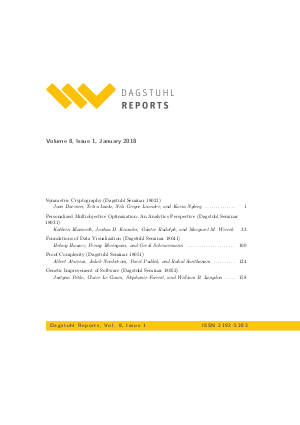Dagstuhl Reports, Volume 8, Issue 1
-
Part of:
Volume:
Dagstuhl Reports, Volume 8
Journal: Dagstuhl Reports (DagRep)

Event
- Dagstuhl Seminars 18021, 18031, 18041, 18051, 18052
Publication Details
- published at: 2018-08-29
- Publisher: Schloss Dagstuhl – Leibniz-Zentrum für Informatik
- DBLP: db/journals/dagstuhl-reports/dagstuhl-reports8
Access Numbers
- Detailed Access Statistics available here
-
Total Document Accesses (updated on a weekly basis):
0PDF Downloads
Documents
Dagstuhl Reports, Volume 8, Issue 1, January 2018, Complete Issue
Abstract
Cite as
Dagstuhl Reports, Volume 8, Issue 1, Schloss Dagstuhl – Leibniz-Zentrum für Informatik (2018)
Copy BibTex To Clipboard
@Article{DagRep.8.1,
title = {{Dagstuhl Reports, Volume 8, Issue 1, January 2018, Complete Issue}},
journal = {Dagstuhl Reports},
ISSN = {2192-5283},
year = {2018},
volume = {8},
number = {1},
publisher = {Schloss Dagstuhl -- Leibniz-Zentrum f{\"u}r Informatik},
address = {Dagstuhl, Germany},
URL = {https://drops.dagstuhl.de/entities/document/10.4230/DagRep.8.1},
URN = {urn:nbn:de:0030-drops-97352},
doi = {10.4230/DagRep.8.1},
annote = {Keywords: Dagstuhl Reports, Volume 8, Issue 1, January 2018, Complete Issue}
}
Dagstuhl Reports, Table of Contents, Volume 8, Issue 1, 2018
Abstract
Cite as
Dagstuhl Reports, Volume 8, Issue 1, pp. i-ii, Schloss Dagstuhl – Leibniz-Zentrum für Informatik (2018)
Copy BibTex To Clipboard
@Article{DagRep.8.1.i,
title = {{Dagstuhl Reports, Table of Contents, Volume 8, Issue 1, 2018}},
pages = {i--ii},
journal = {Dagstuhl Reports},
ISSN = {2192-5283},
year = {2018},
volume = {8},
number = {1},
publisher = {Schloss Dagstuhl -- Leibniz-Zentrum f{\"u}r Informatik},
address = {Dagstuhl, Germany},
URL = {https://drops.dagstuhl.de/entities/document/10.4230/DagRep.8.1.i},
URN = {urn:nbn:de:0030-drops-97345},
doi = {10.4230/DagRep.8.1.i},
annote = {Keywords: Dagstuhl Reports, Table of Contents, Volume 8, Issue 1, 2018}
}
Symmetric Cryptography (Dagstuhl Seminar 18021)
Abstract
Cite as
Joan Daemen, Tetsu Iwata, Nils Gregor Leander, and Kaisa Nyberg. Symmetric Cryptography (Dagstuhl Seminar 18021). In Dagstuhl Reports, Volume 8, Issue 1, pp. 1-32, Schloss Dagstuhl – Leibniz-Zentrum für Informatik (2018)
Copy BibTex To Clipboard
@Article{daemen_et_al:DagRep.8.1.1,
author = {Daemen, Joan and Iwata, Tetsu and Leander, Nils Gregor and Nyberg, Kaisa},
title = {{Symmetric Cryptography (Dagstuhl Seminar 18021)}},
pages = {1--32},
journal = {Dagstuhl Reports},
ISSN = {2192-5283},
year = {2018},
volume = {8},
number = {1},
editor = {Daemen, Joan and Iwata, Tetsu and Leander, Nils Gregor and Nyberg, Kaisa},
publisher = {Schloss Dagstuhl -- Leibniz-Zentrum f{\"u}r Informatik},
address = {Dagstuhl, Germany},
URL = {https://drops.dagstuhl.de/entities/document/10.4230/DagRep.8.1.1},
URN = {urn:nbn:de:0030-drops-92832},
doi = {10.4230/DagRep.8.1.1},
annote = {Keywords: symmetric cryptography, cryptanalysis, authenticated encryption, cryptography for IoT, mass surveillance}
}
Personalized Multiobjective Optimization: An Analytics Perspective (Dagstuhl Seminar 18031)
Abstract
Cite as
Kathrin Klamroth, Joshua D. Knowles, Günter Rudolph, and Margaret M. Wiecek. Personalized Multiobjective Optimization: An Analytics Perspective (Dagstuhl Seminar 18031). In Dagstuhl Reports, Volume 8, Issue 1, pp. 33-99, Schloss Dagstuhl – Leibniz-Zentrum für Informatik (2018)
Copy BibTex To Clipboard
@Article{klamroth_et_al:DagRep.8.1.33,
author = {Klamroth, Kathrin and Knowles, Joshua D. and Rudolph, G\"{u}nter and Wiecek, Margaret M.},
title = {{Personalized Multiobjective Optimization: An Analytics Perspective (Dagstuhl Seminar 18031)}},
pages = {33--99},
journal = {Dagstuhl Reports},
ISSN = {2192-5283},
year = {2018},
volume = {8},
number = {1},
editor = {Klamroth, Kathrin and Knowles, Joshua D. and Rudolph, G\"{u}nter and Wiecek, Margaret M.},
publisher = {Schloss Dagstuhl -- Leibniz-Zentrum f{\"u}r Informatik},
address = {Dagstuhl, Germany},
URL = {https://drops.dagstuhl.de/entities/document/10.4230/DagRep.8.1.33},
URN = {urn:nbn:de:0030-drops-92846},
doi = {10.4230/DagRep.8.1.33},
annote = {Keywords: multiple criteria decision making, evolutionary multiobjective optimization}
}
Foundations of Data Visualization (Dagstuhl Seminar 18041)
Abstract
Cite as
Helwig Hauser, Penny Rheingans, and Gerik Scheuermann. Foundations of Data Visualization (Dagstuhl Seminar 18041). In Dagstuhl Reports, Volume 8, Issue 1, pp. 100-123, Schloss Dagstuhl – Leibniz-Zentrum für Informatik (2018)
Copy BibTex To Clipboard
@Article{hauser_et_al:DagRep.8.1.100,
author = {Hauser, Helwig and Rheingans, Penny and Scheuermann, Gerik},
title = {{Foundations of Data Visualization (Dagstuhl Seminar 18041)}},
pages = {100--123},
journal = {Dagstuhl Reports},
ISSN = {2192-5283},
year = {2018},
volume = {8},
number = {1},
editor = {Hauser, Helwig and Rheingans, Penny and Scheuermann, Gerik},
publisher = {Schloss Dagstuhl -- Leibniz-Zentrum f{\"u}r Informatik},
address = {Dagstuhl, Germany},
URL = {https://drops.dagstuhl.de/entities/document/10.4230/DagRep.8.1.100},
URN = {urn:nbn:de:0030-drops-92853},
doi = {10.4230/DagRep.8.1.100},
annote = {Keywords: Foundations, Interdisciplinary Cooperation, Theory, Visualization}
}
Proof Complexity (Dagstuhl Seminar 18051)
Abstract
Cite as
Albert Atserias, Jakob Nordström, Pavel Pudlák, and Rahul Santhanam. Proof Complexity (Dagstuhl Seminar 18051). In Dagstuhl Reports, Volume 8, Issue 1, pp. 124-157, Schloss Dagstuhl – Leibniz-Zentrum für Informatik (2018)
Copy BibTex To Clipboard
@Article{atserias_et_al:DagRep.8.1.124,
author = {Atserias, Albert and Nordstr\"{o}m, Jakob and Pudl\'{a}k, Pavel and Santhanam, Rahul},
title = {{Proof Complexity (Dagstuhl Seminar 18051)}},
pages = {124--157},
journal = {Dagstuhl Reports},
ISSN = {2192-5283},
year = {2018},
volume = {8},
number = {1},
editor = {Atserias, Albert and Nordstr\"{o}m, Jakob and Pudl\'{a}k, Pavel and Santhanam, Rahul},
publisher = {Schloss Dagstuhl -- Leibniz-Zentrum f{\"u}r Informatik},
address = {Dagstuhl, Germany},
URL = {https://drops.dagstuhl.de/entities/document/10.4230/DagRep.8.1.124},
URN = {urn:nbn:de:0030-drops-92864},
doi = {10.4230/DagRep.8.1.124},
annote = {Keywords: bounded arithmetic, computational complexity, logic, proof complexity, satisfiability algorithms}
}
Genetic Improvement of Software (Dagstuhl Seminar 18052)
Abstract
Cite as
Justyna Petke, Claire Le Goues, Stephanie Forrest, and William B. Langdon. Genetic Improvement of Software (Dagstuhl Seminar 18052). In Dagstuhl Reports, Volume 8, Issue 1, pp. 158-182, Schloss Dagstuhl – Leibniz-Zentrum für Informatik (2018)
Copy BibTex To Clipboard
@Article{petke_et_al:DagRep.8.1.158,
author = {Petke, Justyna and Le Goues, Claire and Forrest, Stephanie and Langdon, William B.},
title = {{Genetic Improvement of Software (Dagstuhl Seminar 18052)}},
pages = {158--182},
journal = {Dagstuhl Reports},
ISSN = {2192-5283},
year = {2018},
volume = {8},
number = {1},
editor = {Petke, Justyna and Le Goues, Claire and Forrest, Stephanie and Langdon, William B.},
publisher = {Schloss Dagstuhl -- Leibniz-Zentrum f{\"u}r Informatik},
address = {Dagstuhl, Germany},
URL = {https://drops.dagstuhl.de/entities/document/10.4230/DagRep.8.1.158},
URN = {urn:nbn:de:0030-drops-92878},
doi = {10.4230/DagRep.8.1.158},
annote = {Keywords: genetic improvement GI, search-based software engineering SBSE, software optimisation, evolutionary improvement, automated software improvement, automated program repair, evolutionary computation, genetic programming, GP}
}